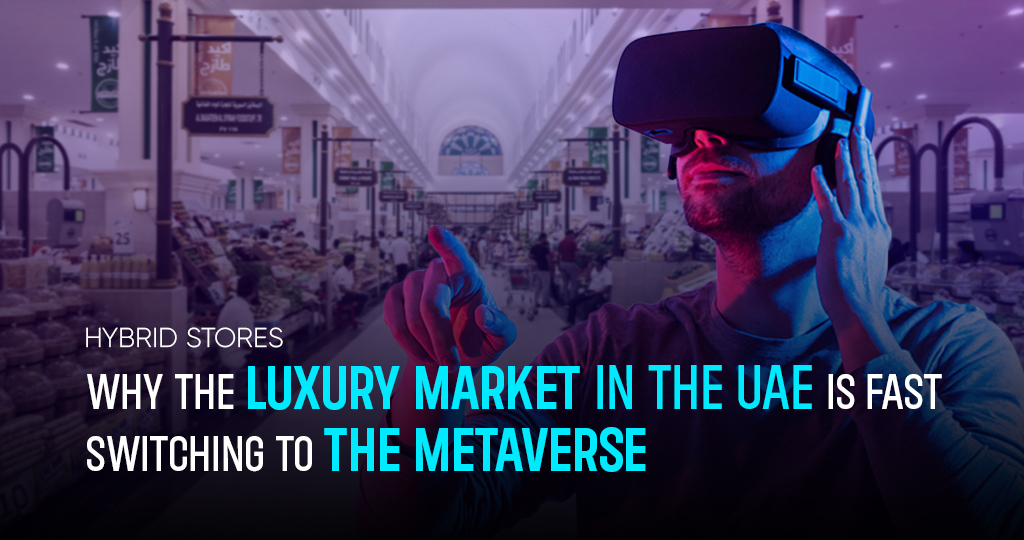Curious about the impact of the metaverse on the retail industry? The fashion industry for instance has already begun its move towards adopting the metaverse. Recently, several fashion brands have invested in virtual advertisements and exhibitions based on the metaverse, as it has gained popularity and created a new realm that merges both physical and virtual lives. Several fashion businesses have invested in the metaverse through games, a $40 billion market as of this year. Several other fashion business are looking to NFTs and intangible clothing as a new perspective to alternate customer experiences.
This has spurred a chain-reaction where major tech corporations have started investing in the development of such NFTs as well. While some metaverse app development businesses, online gaming developers, and social media platforms may act as market leaders, luxury brands start from a level playing field. That being said, it is forecasted that over $50 billion in incremental revenue can be generated by luxury businesses through the metaverse in just 15 years. In the meantime, the primary goal is to build a community and organize events to ultimately allow commerce to thrive based off this new technology. And the change is already here - a recent report by Vogue Business suggests that 53% of fashion brands are investing in the $300 billion gaming industry and are experimenting with Instagram filters, digital avatars, and virtual stores.
What are hybrid stores in luxury markets?
Fashion houses have attempted to innovate to remain relevant in the digital age. A major push in this direction is the hybrid store - online & offline. The rise of the metaverse is both a significant challenge and a huge opportunity for luxury brands in this context. Since the Web3 space might well be the future, social gaming and NFTs could present fashion with powerful opportunities to develop digital assets for the end-user. The metaverse could be the next step in how you use the internet, interact with others, work, play, and even dress.
What benefits does the Metaverse offer fashion brands?
A new market has evolved thanks to the metaverse and products are being promoted by the fashion industry through this channel. It may well be the future of the luxury market in the UAE, with digital interactions and virtual dress tryouts in the metaverse. Just how avatars are the centerpiece of video games, the metaverse also places a greater emphasis on digital self-expression. And this trend has impacted the Fashion industry as well. Several fashion brands are experimenting with avatars and gamification as a means to improve customer experiences. As the metaverse takes shape, it's no surprise to see Dubai’s metaverse strategy for the fashion industry embrace emerging technology, particularly non-fungible tokens, and experiment with new mediums. Here are a few reasons why entering the metaverse can benefits the luxury market:
Massive margins
Simply put, transitioning to a digital platform saves designers and fashion brands a lot of money on fashion shows and product promotions. They no longer have to worry about physical locations for events or the costs associated with it.This in turn can dramatically reduce costs and allow them to focus on their creative efforts more efficiently. Similarly, adopting a virtual approach for retail as well has its benefits - with virtual hoardings and product displays, spendings on branding, marketing and product promotions are virtually nullified.
Profits from the secondary market
There is another compelling reason to experiment with the metaverse and fashion NFTs. These tokens are based on smart contracts, which govern the terms and conditions of the underlying digital asset. This means that a brand can embed a royalties-related code so that they get a cut of the transaction every time a virtual garment changes hands. The same cannot be said of today's secondary market, as resold items typically bring no additional money to the original designer or fashion brand. In addition to the fabricant, there are other digital fashion houses taking royalties on reselling garments.
No inventory or oversupply
Overproduction, over-inventory, and end-of-season stock are common issues for fashion brands. A virtual fashion collection eliminates many of these issues by remaining in the digital realm. Unless they wish to produce a real version of the garment in the real world, buyers do not receive a physical version of the garment.
Creativity and innovation
In many ways, fashion is about everything except the clothes and accessories themselves. Creative processes, freedom of expression, personal enjoyment, and the message our choices send are the pillars of the industry. However, designers are still unable to create pieces that defy gravity, fabric limitations, or material durability, so their creative options are limited. That's finally out the window. Creating fashion for the metaverse breathes new life into the industry by freeing creators from all constraints. Liquid gold, water, and fire are already being used to make garments in an impractical, if not impossible, way. With such a unique canvas, the door is wide open for original and eccentric creations. Another way that fashion brands are leveraging the metaverse is by dusting off archival designs and re-creating metaverse-only versions.
High personalization
Metaverse technology enables us to access fashion that is tailored to us, as individuals, versus the masses, as part of the customer experience enabled by it. Metaverse fashion apparel allows avatars to get customized to the tiniest detail, because "custom" apparel can be made in the metaverse. Personalized garments are becoming increasingly popular in a market that is becoming more customer-centric. The metaverse also assigns unique serial numbers to each digital item, further solidifying its position as a truly unique fashion piece.
Engagement
Newer and more dynamic forms of consumer engagement have been created as brands embrace virtual spaces and cutting-edge technology. Digital fashion pieces are constantly updating, so purchasing a garment in the metaverse will be static and dull. Therefore, fashion brands must accommodate their customers' needs by staying current.
Accessibility
There is no secret that fashion is one of the most difficult industries to break into. This does not have to be the case in the metaverse. Decentralization is a key pillar behind the concept of virtual worlds and the upcoming web3. The role of intermediaries will be eliminated, significantly lowering the barrier to entry. Fashion brands, new designers, and established brands alike will all have the ability to share their work freely across multiple virtual worlds via metaverse boutique stores.
Metaverse redefines luxury experiences
The metaverse is an immersive digital space in which personal experiences and interactions cause people to forget they are in a simulated environment. It is the internet on steroids, with more realistic ways to improve user experience than previous digital and internet iterations. It's a hybrid of social media, virtual and augmented reality, gamification, and digital products like NFTs. Consider buying anything in today's high-end e-commerce environment. Most online shopping experiences are similar. They operate on the same principles as a physical store. It is also extremely common for brands to offer extremely similar experiences from entering the store to checking out. However, luxury should never be a one-dimensional experience. Technology and digital experiences are increasingly pervasive in our lives. As a result, thinking of a fully interconnected user experience to metaverse is critical.
How should luxury brands interact with the metaverse?
At the height of the pandemic, several of the world's most beloved fashion brands, from Louis Vuitton to Hermes, shifted their focus from the well-dressed front row to the digital world. The potential financial and advertising benefits of adopting the Metaverse in the fashion business have also enticed brands. While tech behemoths, online gaming developers, and social media platforms may be considered the field's frontrunners, luxury brands have laid the groundwork for fair competition.
1. Understanding the customer's needs in more detail
The metaverse could provide luxury brands with the ability to easily conduct trend checks, evaluate production quantities, and determine whether to manufacture specific products based on virtual demand. This is critical because it allows brands to collect customer feedback and plan for the future. Brands can also use the metaverse to share cutting-edge ideas with interested users, corporations, and virtual prototypes. These concepts can be tested on virtual platforms before being rejected in the real world.
2. Customer-brand relations built on long-term trust
With the growing influence of the digital world, it is not unlikely that people will spend a significant portion of their social lives on digital platforms. Using engaging content/products online and capitalizing on this to build brand loyalty, brands can harness this curious audience online. For example, younger customers can buy their "dream" luxury items in virtual worlds without spending too much money, which is a fantastic way for brands to build long-term loyalty.
3. Creativity can be explored more deeply by designers and artists
The metaverse allows businesses to experiment and broaden their horizons in ways that were previously out of reach. Luxury brands can now redefine their narratives and bring virtual experiences to life while also capitalizing on their real-world heritage. By encouraging users who purchase digital outfits inspired by their products, brands can look to establish a stronger online presence with the younger generation. The best example is Louis Vuitton, which created Louis the Game to allow fans to discover the brand's history with new eyes while retaining its integrity and creativity.
4. Keep it meta
Some luxury brands in the metaverse will undoubtedly grow in the coming years. Digital showrooms and visual product purchases will make the metaverse light-years ahead of what we are accustomed to today. As technology advances, more features that combine offline and online shopping will become available. Physical shopping is far still completely replaced by digital shopping. It will take some time for people to relinquish the experience of visiting a store and the desire to see and feel high-priced luxury goods before buying them. Brands will instead use it to supplement their physical stores and reach a wider audience.
5. Metaverse suggestions for luxury brands
Metaverse will be worth roughly 10% of the value of luxury corporations. Given the impact of the digital revolution on the current infrastructure, luxury brands must be at the forefront of this transformation. As an IT consulting company in Dubai, we believe that by providing experiences across multiple touch points and platforms, the virtual world can be used to enhance the physical world. Regardless of how enticing it may be to seize all of the opportunities that the metaverse appears to offer, luxury brands should not ignore the physical world just for the sake of the hype. However, to reap the full benefits of this new world, digital and physical must find a way to coexist in perfect harmony.
Leveraging the metaverse for luxury brands - Top 10 brands
Fashion brands are drawn to the metaverse for various reasons. By utilizing digital clothes, businesses seek to attract younger audiences, as they offer unprecedented levels of online social clout, and virtual environments can significantly lower our lifestyle's excessive resource consumption as well (sustainability). In addition, marketers can scale the experience to any size thanks to its nearly limitless scalability. Even emerging designers are not constrained by expensive materials or a lack of funding digitally. Top 10 fashion metaverse brands that will inspire you
1. Gucci
This fashion label has launched a number of initiatives that have propelled the Italian luxury label to new heights in the fashion world. The Aria collection inspired its first NFT-related project. Gucci recently collaborated with the metaverse to launch a space called Gucci Garden.
2. Louis Vuitton
This fashion house rose to prominence after releasing a mobile game in collaboration with digital artists Beeple to commemorate the 200th anniversary of founder Louis Vuitton last year. The mobile game is called 'Louis the Game,' and it gives users an insight into the storied brand.
3. Balenciaga
Balenciaga's journey from Paris Fashion Week to the metaverse is impressive. This luxury label was the first to release an NFT capsule collection in the videogame Fortnite, a wildly popular virtual world where players can build their own games, in 2023. It is worth noting that users can visit the Balenciaga store and purchase virtual Balenciaga items.
4. Nike
Nike is another active brand in the metaverse fashion domain. Having launched a number of digital-only initiatives that make use of blockchain and web3 technology. It made its debut on Roblox with the creation of Nikeland. This metaverse location is modeled after the company's physical headquarters.
5. Burberry
Burberry is the oldest luxury fashion brand in the metaverse. It was one of the first brands to introduce NFTs in China. By launching a virtual bag collection in Roblox, the company has continued to expand the user experience into the Metaverse.
6. Adidas
Adidas created a digital collection that drew attention from all over the world. This collection was created in conjunction with the Bored Ape Yacht Club, Pixel Vault's PUNKS comics creators, and crypto investor Money. Buyers can buy not only the NFTs but also the physical clothing that goes with them.
7. Forever21
Forever21 brand made a splash in the fashion world, but it has also carved a niche for itself in the metaverse market. The brand had a dynamic storefront with Forever 21 avatars and a variety of 21 fashion NFTs inspired by physical store pieces. It has also created the "Forever 21 Shop City", where users, fashion influencers, and creatives can design, own, and manage their own stores.
8. Givenchy
Givenchy is a well-known French luxury brand for clothing, cosmetics, and perfumes. Now, Givenchy has opened a beauty salon in Roblox. In addition, the brand has launched its NFT collection on the polygon blockchain.
9. Dolce & Gabbana
Handbags, accessories, and cosmetics are some of the major products that Dolce & Gabbana promotes. The fashion retailer has been around for decades and is still growing. Collezione Genesi, the brand's first NFT collection, was released in September 2021. It was a collection of NFT’s created in partnership with the digital marketplace. The polygon blockchain was used to complete the project. The group sold for more than $5 million in US dollars. It was one of the first NFT collections launched by a luxury fashion brand, paving the way for others to follow suit.
10. Hermes
Hermes the iconic fashion label, has hinted at major web3 plans after filing a trademark to protect its brand in virtual worlds, covering virtual clothing and non-fungible tokens. It seems Hermes intends to launch a virtual marketplace and web3 financial services, including a virtual currency linked to digital collectibles and non-fungible objects. Fashion shows and trade shows in both AR and VR environments are also mentioned in the trademark application. The move comes after a high-profile legal battle with Mason Rothschild, the creator of the Metabirkin NFT, whom Hermes accused of copyright infringement of its iconic BIRKIN trademark.
Conclusion
Digital transformation is integral to the luxury market is being leveraged by the fashion industry to delve into the metaverse. In this space, brands can form alliances to create something new and collaborate on a common platform for a new project. Brands could exchange blueprints of the open metaverse to start conversations and share resources and services. Furthermore, it will aid in the development of initial standards and digital frameworks. Even though virtual reality is here now and having an impact, many aspects of the metaverse are still a decade away. It will require collaboration across industries, countries, academics, civil society, and regulators. The already relatively conventional boundaries between the real and virtual worlds will be erased.
Many people already live and work in different parts of the world, have meetings with colleagues from other countries, and shop in stores in different parts of the world without leaving their homes. The luxury market is worth billions of dollars and is expected to grow further in the future. Despite the enormous growth of the luxury industry, traditional luxury firms are now losing money due to their reliance on high-volume sales. The Metaverse has the potential to change that for these high-end businesses. As a result, the Metaverse represents a potentially multibillion-dollar opportunity for luxury companies to leverage their marketing and customer acquisition strategies. The metaverse is an amalgamation of culture, art, fashion, entertainment, and technology.
It's still in its early stages, but brands have the opportunity to curate some impressive opportunities. Don't be afraid to be inventive and try new things. After all, the metaverse arose from the imagination. Make the pioneers of science fiction proud. Way2Smile Solutions is one of the most trusted IT consulting companies in Dubai for digital platforms and products that simplify, optimize, and deliver impact that puts our clients one step ahead. Innovative ideas become a reality with our zestful team. If you need any kind of information, feel free to contact us.







